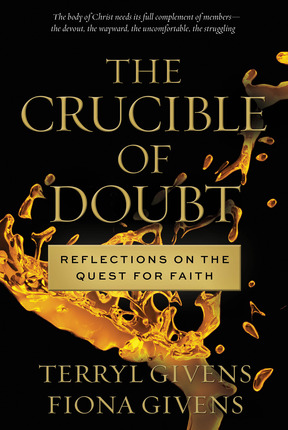I once attended a sacrament meeting in which a young man bore his testimony that he was so glad to be in the “Lord’s true church” on that Sunday, because it was only in that place that he would find truth.
Any other place to be would be a “complete waste” of his time, he said.
I was simmering. Nowhere in his smug testimony was there any sense of humility or an acknowledgment that other religions have truth too — that we have much to learn from them, in fact. That Mormonism is young and untested, however energetic. That we are on a journey that many others have walked and are walking, though we use different language to describe it.
No, this guy’s witness of faith was pure self-congratulations: “We’re in the only right, 100% God-approved place we could be today, folks! YAAAAAAY US!”
Harrumph. I’d like give that arrogant young man some reading material: chapters 7 and 8 of The Crucible of Doubt, the book we’ve been working our way through on Fridays this month. (Here are the discussions for weeks 1, 2, and 3.) Especially in chapter 7 (“Mormons and Monopolies: Holy Persons ‘Ye Know Not Of'”), the authors warn of the dangers of religious conceit:
If Joseph initially thought only Mormons had access to truth or goodness, he was abruptly corrected of his misperception a year into the Church’s founding. In an 1831 revelation, the Lord told him that most of the world was under sin, “except those which I have reserved unto myself, holy men that ye know not of.” The words were a poignant indication that while Joseph might be a true prophet, the Lord’s disciples were not limited to those who found themselves in the restored Church. (p 88)
I wouldn’t say that guy’s Mormon arrogance is typical, but it’s not unusual either. I’ve written before about what it felt like to sit in sacrament meeting with my Protestant husband when someone proclaimed from the pulpit that the LDS Church is the “only true and living church on the face of the earth.”
I whispered to Phil that he had better hurry up or he’d be late to services at his false and dead church.
Seriously, what other message did we imagine non-Mormons would hear, being on the receiving end of fully weaponized language like that?
So for this week’s discussion, let’s talk about Mormonism and other religions. Terryl Givens has explained before, quite beautifully, that one of the defining tensions of Mormonism is this balance between the exclusive and the universal. With that in mind . . .
- What do you think about the idea that early Mormons’ vigorous language about other churches being “abominations” was not directed at Catholicism, as the Church has sometimes subsequently suggested, but against the Protestant teachings of Smith’s own time—namely, that God was impersonal and “unmoved by human suffering”?
- What ideas and quotes from the Givenses’ book might help us to (politely) counter this misleading idea about Mormonism having a monopoly on the truth?
- Do you believe this is the “only true and living church on the face of the earth today,” as some Mormon leaders have taught? What do you make of that phrase?
- The authors quote our LDS scripture about there being “holy men that ye know not of,” noting that God’s true disciples are not limited to members of the LDS Church. When have you personally encountered grace and truth in another faith? In your experience, has the institutional Church historically been as open to truth being found in other religions as these quotes from the earliest LDS leaders might suggest?
- Chapter 8 continues the theme of universalism and truth being found in many places by encouraging Mormon readers to cultivate spiritual “wells” in many different ways—devotional reading of Mormon and non-Mormon books, listening to music, etc. Do you agree that the Church’s emphasis on efficiency as a worthy goal has resulted in a “dependency” on the part of Mormons, as they come to expect that the Church will have an answer to every issue in life? And where is your own “well” filled?
For next week, we’ll finish up our five-week book club with the last three chapters of the book (9 to 11), with a focus on staying faithful even when God is silent.
All the posts in this series on doubt:
- Kickoff here: Mormon doubts? Let’s talk about them
- Chapters 1 & 2 discussion here: How do Mormons deal with doubt?
- Chapters 2 & 4 here: “I know the Church is true” and other Mormon muddles
- Chapters 5 & 6 here: The dangers of idolizing Mormon prophets
- Chapters 7 & 8 here: Mormonism as “the only true and living church”
- Chapters 9 to 11 here: Staying Mormon when God is silent






